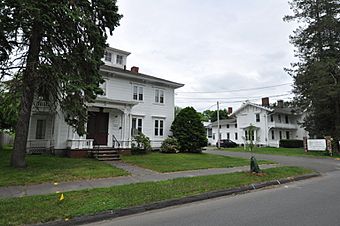Pomeroy Terrace Historic District facts for kids
Quick facts for kids |
|
|
Pomeroy Terrace Historic District
|
|

College Church buildings on Pomeroy Terrace
|
|
| Location | Pomeroy Terr., Phillips & Butler Pls., Bixby Ct., Hawley, Hancock, & Bridge Sts., Northampton, Massachusetts |
|---|---|
| Area | 32 acres (13 ha) |
| Architect | William Fenno Pratt |
| Architectural style | Federal |
| NRHP reference No. | 100002420 |
| Added to NRHP | May 11, 2018 |
The Pomeroy Terrace Historic District is a special area in Northampton, Massachusetts. It is like a preserved neighborhood where many old and beautiful homes from the 1800s still stand. This district is located on the east side of downtown Northampton, near the railroad tracks. Because of its important history and well-kept buildings, it was added to the National Register of Historic Places in 2018.
Contents
Discovering Pomeroy Terrace
This historic district is a great example of how towns grew in the 19th century. It shows us what a popular neighborhood looked like back then. The area is known for its many different styles of homes.
A Look Back in Time
Northampton was first settled way back in 1654. The Pomeroy Terrace area was home to one of the town's very first important places, the Bridge Street Cemetery. This cemetery is at the northern end of the historic district.
At first, only the main road, Bridge Street, was developed. But in the mid-1800s, Northampton started to grow quickly because of the railroad. The land east of the railroad, which used to be large farms, was divided into smaller lots for building houses. Most of the homes you see today in Pomeroy Terrace were built between 1855 and 1870.
What Makes the District Special?
The Pomeroy Terrace Historic District covers about 32 acres (13 hectares). It is mainly defined by two north-south streets: Pomeroy Terrace and Hawley Street. A few smaller streets connect them, and these also have important historic buildings.
The district even includes the old Bridge Street Cemetery. It is also right next to another historic area called the Parsons, Shepherd, and Damon Houses Historic District.
Homes Through the Ages
Most of the buildings in the Pomeroy Terrace Historic District were originally built as wooden homes. Some of these houses are now used as offices or businesses, but they still keep their original look.
The homes show many different architectural styles. You can see older Federal style houses from the late 1700s on Bridge Street. There are also Stick Style and Colonial Revival houses from the late 1800s and early 1900s. This mix of styles helps tell the story of how the neighborhood changed over time.



